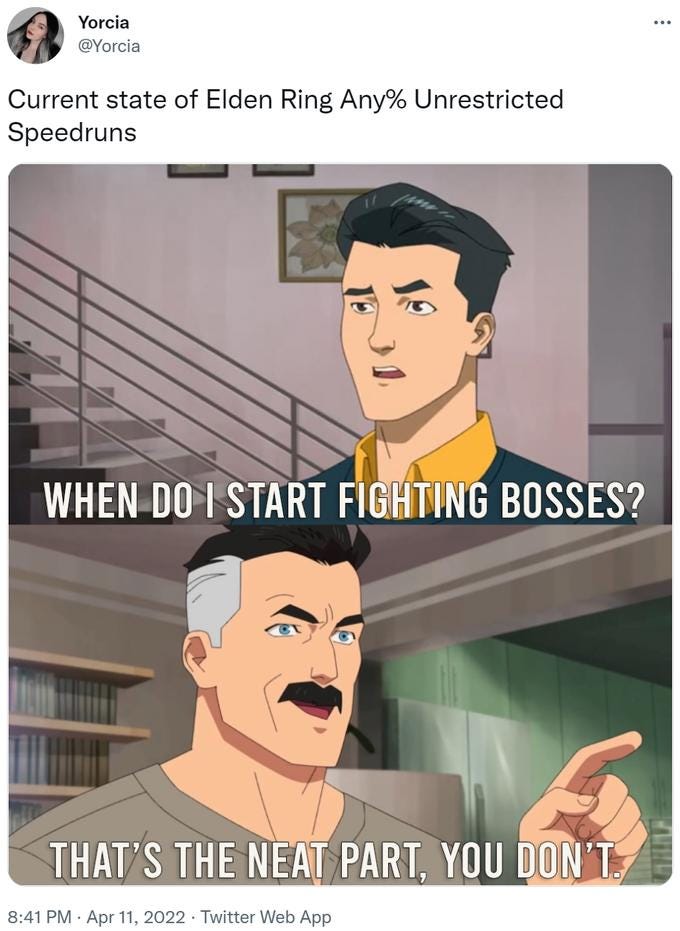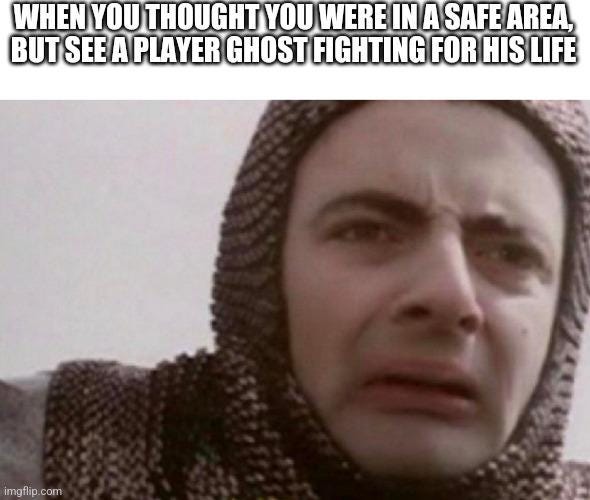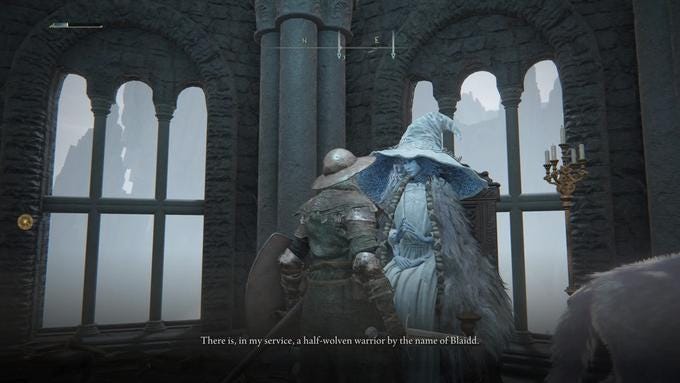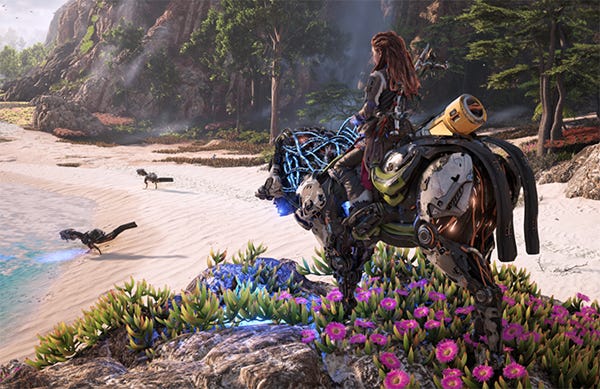I've already written about Elden Ring. It's such a big, unique, popular game that not picking it apart a bit is game-writer malpractice.
Even if you hate From Software games, and many do, if you care about game design as an art, it's worth a good look. It's such a big, successful title, with so much strangeness, that there's a lot to learn. Even its mistakes are fascinating.
Elden Ring Is Undeniable
Elden Ring has had massive sales.
The people who bought it liked it. The retention rate for this game is incredibly good. Almost 40% of players beat Malenia, the toughest boss in the game, who is way in the back in a secret dungeon. Normally, a game is considered amazing if 40% of players play it for more than a few hours.
It also got good reviews, for what that's worth.
It's a strange, jagged, extremely challenging game, but masses of people bought it and loved it. That means that Elden Ring is undeniable. A huge segment of the gaming public is saying, "This is weird, but we LIKE it."
Games like this are a treasure, because they are a valuable reality check. It's all great for writers to blog and tweet and proclaim what the "True meaning of vidya gaems" is, but Elden Ring is a chance to compare our musings with actual, you know, reality.
NOTE: The lessons to be learned are positive ones. As in, it says that developers are ALLOWED to do a certain thing, not that they HAVE to do it. So if you don't like this sort of game, you're safe. The huge success of titles like this helps expand the window of what can be considered.
Settling the Difficulty Debate For, Like, 8 Seconds
One of the unending, tiresome debates on the Extremely Online end of the gamer spectrum is whether games should always have an easy difficulty. Accessibility is a word that gets thrown a lot, as if a work of art is obligated to try to appeal to everyone.
(Everyone loves to boss around artists.)
And hey, most games should have a casual difficulty. Mine certainly do. However, there are reasons to have one difficulty level, and it kind of gripes me when people pick on my fellow artists for trying to create the experience they really want to.
If Elden Ring does nothing else for humanity, it quieted this interminable debate for like a minute. If you play the game and look at the way people engage with it and talk about it, I think it really shows the value of its approach to difficulty.
The Value of a Communal Experience
In our infinitely fractured culture, it is very hard to share a mass experience. The advantage of Elden Ring having one difficulty level is that we can share the experience.
This is a game where the first boss you meet, the Tree Sentinel, is walking lazily down a road right by where you start. It's optional and easy to sneak around. If you get close, though, unless you are an amazing player, it will melt you. The first major boss, Margit, is a half hour down the road. Again, when you stumble into it, it will likely be WAY too hard for you.
When someone says, "What's the deal with the Tree Sentinel?" or "I was stuck at Margit but I beat my head against him for hours and I won!" then I know exactly what experience they had. They fell into the same traps, had to figure out their way around the same attacks. It’s silly that this makes me feel part of a group, but it does.
Combined with the fact that you'll need to consult a wiki 87 times to figure out the game systems and find the hidden bosses, and From Software games are great at creating community. Sharing knowledge, to overcome a shared experience. It is very, very cool.
And if Elden Ring is unplayable for you, for whatever reason? You certainly have my sympathy, but 90000 video games came out last month. Try Horizon Forbidden West! It came out the same time, I hear it's good, and I think you can ride a robot horse.
A Word About Production Values
As a work of visual art, this game is very, very, very pretty. How’s that for game criticism?
But a Lot of Pretty Things get Repeated
While Elden Ring is enormous, a lot of that length comes from repeated content. Some bosses show up, lightly reskinned, four times or more. The mines and crypts are all mostly the same (though the later crypts have a few very clever changes).
Fortunately, when you get tired of a certain sort of content, you can skip it. But this is the sort of thing that tends to annoy a certain sort of player. Fortunately, as long as the rest of the game is good, people will only complain. They’ll still give you their money.
As for me, when I found it starting to get repetitive, I just skipped stuff. The game is already huge.
And honestly? Fighting the same boss a few times is ok if the game is fun. I mean, when I was a kid I played a ton of Pac-Man, and we never complained that the four ghosts were the same every time.

Balancing One Game Is Hard. Balancing Two Games At a Time Is Impossible
Allegedly, Elden Ring doesn't have different difficulty levels. In reality, it has two.
You can choose to summon friends to help you with bosses. Either NPC characters, ghost monsters, or actual human players. In RPGs, summoning help tends to be one of the most effective, satisfying abilities you get. I beat almost every boss with the help of summoned friends, and it makes the game WAY easier. With this weapon at your disposal, the difficulty of Elden Ring is exaggerated.
However, old-school Souls players want the old-school experience. Which means fighting the enemies toe to toe with no help. In Elden Ring, this is very difficult, because the encounters are balanced to be tough when you have a friend.
So Elden Ring had to be balanced in two ways simultaneously, for groups and for solos. This is pretty much impossible. They ended up with bosses that can often be too easy (with summons) or crushingly difficult and demanding (without).
Hardcore players like to play solo because they get the full, tense adrenaline challenge. The funny thing is, not only do I understand this feeling, I started to share it. Even though I suck at games, near the end of Elden Ring I started skipping summons, just to prove to myself I had Pro Gamer Energy.
I think this is a problem. No matter who you are, Elden Ring is balanced to be unsatisfying. And yet, again, the numbers don’t lie. The game is undeniable. So it’s fine, I guess. I don’t know why, but it’s fine.

No Game Is Immune To Criticism
When Elden Ring came out, it had problems. Some glaring balance issues. Some attacks were way too strong. Most of the spells were useless. The fact that, to get the tutorial, you had to THROW YOURSELF OFF A CLIFF.
This led, of course, to unending gamer debates. "This boss has an undodgeable ability. "Git gud, scrub!" "Most of my spells are terrible." "From Software has a plan, idiot!" "I missed the tutorial." "Why didn't you throw yourself off a cliff like a SMART PERSON!?" "Why can't I have a pause button?" "Because ... because ... Shut up!"
Since these are mischievous games with a trollish streak, superfans can excuse any fault. Something about the game is obviously broken? They can always give a reason to not fix it. The game is supposed to be mean!
Then several patches came out. Overpowered abilities got nerfed. Spells got made stronger. The path to the tutorial was clearer. Turns out, these games can have Actual Problems, and it is good to fix them.
And yet, a lot of controversial things, like uber-boss Malenia's uber-attack, are unchanged.
Which brings up the key question: How do you know what to fix and what to leave alone? How does any developer know?
The answer is ...
You Need To Know Exactly What Product You Are Selling.
When you're selling a game, you're selling a specific sort of experience. You're trying to create a specific reaction in the player's head. You need to know what that is. Then you need to remove things that keep that reaction from happening.
From Software games are selling a lot of things, but above all, they are selling awesome fights: Tense fights you have to learn and practice and master, which frustrate you and torment you and then give a huge flood of endorphins and satisfaction when you beat them.
To get that feeling, you need to know how fighting works, so you HAVE to find the tutorial. You need a wide variety of useful attacks, so that you can pick one that matches your style. You can't have any attacks be too strong, or you lose the challenge that is the key to the experience.
Patching isn't just fixing bugs. It's an art form. It is where you use tons of user feedback to perfect the experience and make your game be closer to the thing it wants to be.
You should ALWAYS listen to player complaints. You don't have to fix them. You certainly don't need to fix them in the way the player suggests (which is almost always a bad idea). But you should know how your game affects your players' brains.
That's It
Loved this game. You might not. Still an enormous amount for designers to learn from here. And my gosh, it sure is pretty.
We have announced our next game, Queen’s Wish 2: The Conqueror, an all-new, innovative, Empire-building indie RPG, coming later Summer. Wishlist it to be told when it is released!







Just a quick note to let you know I appreciate your newsletters. Always entertaining and informative reads (no pressure). It's nice seeing them show up in my inbox.